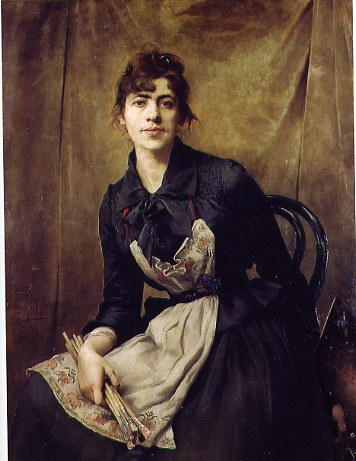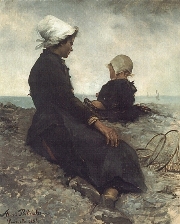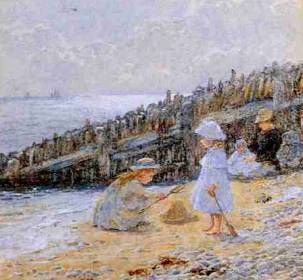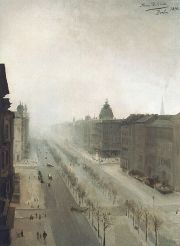Ellen and Jim Have a Blog, Too
We are two part-time academics. Ellen teaches in the English department and Jim in the IT program at George Mason University.


Anna Bilinska: _Self-Portrait with Apron and Brushes_ · 14 January 06
My dearest Anne,
I had promised I would send you images of paintings by women artists regularly in letters where I also provided information about them, texts, and links to sources I could find. I have been woefully remiss, partly because I have so many of these portraits. I’ve been writing them for Chava’s two lists (Eighteenth Century Worlds and Women Writers Through the Ages) for months now, and recently have begun to do it for Trollope-l (Trollope and his Contemporaries) too. So I don’t know where to begin.
Plus many of them are not complete. They are genuine essays, attempts at suggestive presences and invitations to remember and to dream and to think.
I decided this morning I’d try to go in alphabetical order (more or less) beginning with one I put on Women Writers. Here’s a self-portrait liked very much by Fran W and Judy G (two of whose poems Elinor has now sent Marianne so perhaps you’ve seen them):
Anna Bilinksa (1857/58-1893) Self-Portrait with Apron and Brushes (1887).
I like it for the expression on her face. The steely look in her eyes.
About this painting in Seeing Ourselves: Women’s Self-Portraits,
Frances Borzello writes:
The Polish artist Anna Bilinska paints herself taking a break from her work. She is convincingly scruffy. She has not bothered to remove her apron, and, although her hair began the day pinned up, some tendrils have escaped. As she sits on the homely bentwood chair, she bends forward to stare at the spectator, a bunch of brushes held across her apron in one hand and her palette hanging down at the extremity of the other . . . This pose of Bilinksa’s had not been seen before. She has set herself down in front of the curtain which forms a background for the model. The combination of transitory pose and backcloth is an understated but witty way of telling the spectator that she has become—but only temporarily—the model not the artist.
In a little pen sketch at the back of the book, Borzello says further that Bilinska was born in the Ukraine in 1857/58 and died in Warsaw in 1893. Bilinska painted portraits, seascapes, and landscapes. Her teachers included Robert-Fleury (Paris). She was married in 1892.
So she died one year after marriage. I can find no hint of how or why she died or anything about her art in any public online sources. Here is one meagre site (as to information about her): Anna Bilinska-Bohdanowicz, Academic Classical Artist. Particularly striking is the painting of a lady with the opera glasses looking on, the outsider. This one reminds me of the woman in black at the opera or the woman with opera glasses looking down from afar at the stage of life, well-known ones by Mary Cassatt). Have a look at the peasant woman and her young child at a seashore, a common motif among women painters at the close of the 19th century. Again a couple by Mary Cassatt are famous, but Helen Allingham has a controlled lushly beautiful watercolor using this motif. Allingham’s typical richness of color and blending of figures into the landscape (signifying what?) provides a strong contrast to Bilinska dark melancholy still figures seen from the back:
Anna Bilinska, At the Seashore
Helen Allingham (1848-1926), Young Girls at the Beach
The trope of women and children at the beach is common among later 19th century women artists. Bilinska seems to me unusual as a woman artist for her choice of hard lines, cool colors and lack of sentiment. Many women artists of the later 19th and early 20th century preferred to revel in color.
There is, though, hardly any hard information about Bilinska’s life or how she died in my 4 survey-of-women-artist books.
Bilinska exhibited in Paris from 1885 and in Munich and Warsaw, and won gold medals at the Paris Exposition Universelle 1889 and for this self-portrait at the Berlin International Exposition, 1891.
I close with a melancholy landscape of a modern city that speaks for itself:
Unter den Linden in Berlin (1890)
I hope you and the Captain are keeping well, my dear,
Sophia
--
Posted by: Ellen
* * *
Comment
commenting closed for this article




